
The Enchanting Sands of Merzouga
Welcome to Merzouga, a small village in southeastern Morocco, known for its stunning dunes of the Sahara Desert. The region is home to Erg Chebbi, one of Morocco's most majestic sand dunes, which rise up to 150 meters high and stretch over 30 kilometers long. These golden dunes provide a mesmerizing backdrop for unforgettable adventures and serene moments of reflection. The Merzouga region offers a variety of activities for tourists. You can embark on a camel trek to witness the breathtaking sunrise or sunset over the dunes. For thrill-seekers, sandboarding and quad biking offer an adrenaline-packed way to explore the desert. At night, the clear sky reveals a spectacular display of stars, making Merzouga an ideal spot for stargazing. In addition to its natural beauty, Merzouga is rich in cultural experiences. Visit a traditional Berber village to learn about the local customs and lifestyle. You can also enjoy a night in a desert camp, where you can savor traditional Moroccan cuisine and listen to live Berber music around a campfire. The hospitality of the locals will make your visit to Merzouga truly memorable.
Local tips in Merzouga Region
- Best time to visit is from October to April when temperatures are cooler.
- Bring plenty of water and sunscreen to stay hydrated and protected from the sun.
- Wear comfortable clothing and shoes suitable for desert activities.
- Consider hiring a local guide to enhance your experience and learn about the region.
- Don't miss the opportunity to try traditional Moroccan food at a desert camp.
The Enchanting Sands of Merzouga
Welcome to Merzouga, a small village in southeastern Morocco, known for its stunning dunes of the Sahara Desert. The region is home to Erg Chebbi, one of Morocco's most majestic sand dunes, which rise up to 150 meters high and stretch over 30 kilometers long. These golden dunes provide a mesmerizing backdrop for unforgettable adventures and serene moments of reflection. The Merzouga region offers a variety of activities for tourists. You can embark on a camel trek to witness the breathtaking sunrise or sunset over the dunes. For thrill-seekers, sandboarding and quad biking offer an adrenaline-packed way to explore the desert. At night, the clear sky reveals a spectacular display of stars, making Merzouga an ideal spot for stargazing. In addition to its natural beauty, Merzouga is rich in cultural experiences. Visit a traditional Berber village to learn about the local customs and lifestyle. You can also enjoy a night in a desert camp, where you can savor traditional Moroccan cuisine and listen to live Berber music around a campfire. The hospitality of the locals will make your visit to Merzouga truly memorable.
When is the best time to go to Merzouga Region?
Iconic landmarks you can’t miss
Dunes d'Erg Chebbi
Discover the breathtaking golden sands of Erg Chebbi, where adventure meets tranquility in the heart of Morocco's Sahara Desert.
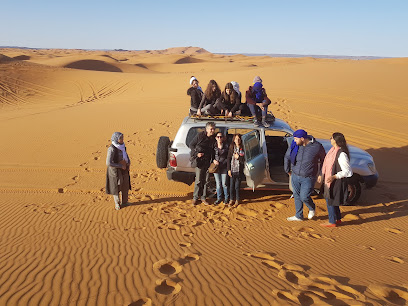
Kasbah Mohayut
Discover the charm of Kasbah Mohayut, where Moroccan hospitality meets the breathtaking beauty of the Sahara Desert.
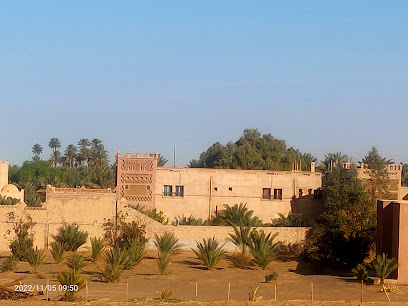
Merzouga Desert
Experience the breathtaking beauty of the Merzouga Desert, where adventure meets rich Berber culture in the heart of Morocco's Sahara.
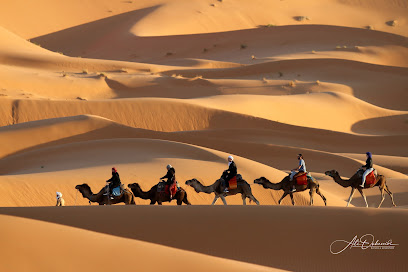
Auberge Kasbah Merzouga
Experience the enchanting Sahara Desert at Auberge Kasbah Merzouga, where comfort meets traditional Moroccan hospitality.

Palais des Dunes
Experience the charm of Palais des Dunes, a serene hotel in Ksar Tanamouste, offering luxury, comfort, and a taste of Moroccan hospitality.

Erg Chebbi
Explore the breathtaking Erg Chebbi dunes in Morocco, where adventure meets tranquility amidst stunning desert landscapes and vibrant sunsets.
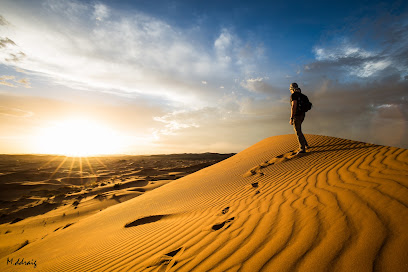
Hotel Kasbah Azalay Merzouga
Discover the charm of the Sahara at Hotel Kasbah Azalay Merzouga, where traditional Moroccan hospitality meets modern comfort in a breathtaking desert setting.
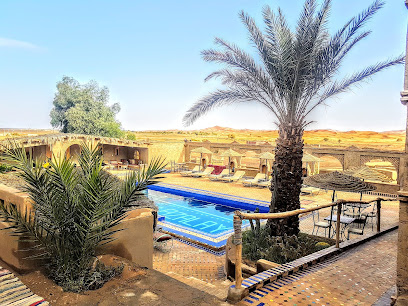
Hôtel Les Portes du Désert
Discover comfort and adventure at Hôtel Les Portes du Désert, your perfect base for exploring the stunning landscapes of Merzouga and the Sahara.

Hotel Sahara Garden
Discover the allure of the Sahara Desert at Hotel Sahara Garden, your serene oasis in Erg Chebbi, Merzouga, with a touch of Moroccan hospitality.
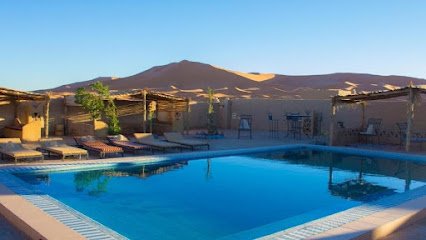
Riad Chebbi
Discover the luxury and cultural richness of Riad Chebbi in Merzouga, your gateway to the majestic Sahara Desert.
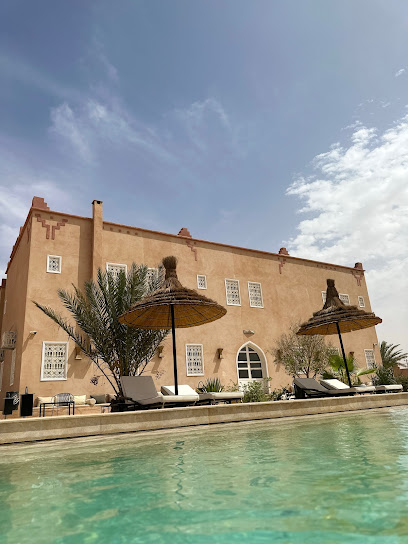
L'Homme du Désert
Discover the enchanting blend of Moroccan hospitality and desert adventure at L'Homme du Désert, the perfect oasis in Merzouga.
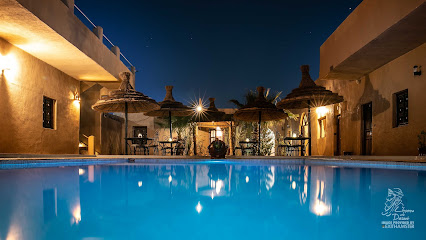
Kasbah Le Touareg
Experience the charm of Moroccan hospitality at Kasbah Le Touareg, a serene retreat in the heart of Merzouga, surrounded by the majestic Sahara Desert.
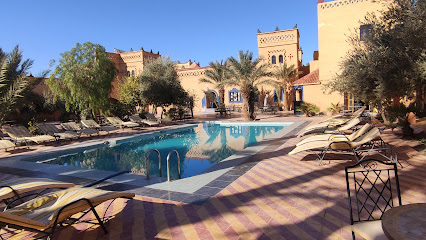
Sahara Desert Luxury Camp
Discover ultimate comfort and adventure at the Sahara Desert Luxury Camp, the gateway to experiencing the majestic Sahara Desert in Morocco.

Desert Villa: boutique Hotel Merzouga
Experience the enchanting beauty of the Sahara Desert at Desert Villa, a boutique hotel offering authentic Moroccan hospitality and stunning landscapes.
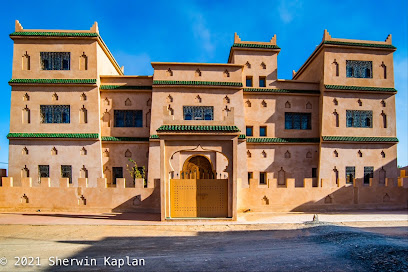
Maison Merzouga Guesthouse
Discover the magic of the Sahara at Maison Merzouga Guesthouse, where authentic Moroccan hospitality meets stunning desert adventure.

Unmissable attractions to see
Erg Chebbi
Explore the mesmerizing golden dunes of Erg Chebbi, a stunning desert oasis in Morocco, offering adventure, tranquility, and cultural richness.
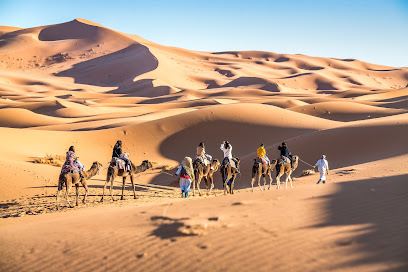
Sahara Safari adventure
Experience the thrill of the Sahara Desert like never before with Sahara Safari Adventure's exhilarating ATV rentals and breathtaking landscapes.
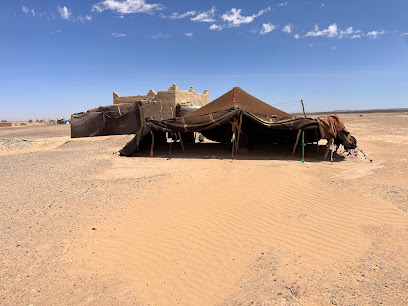
Tiziri Camp - Luxury ECO Desert Camp Merzouga
Discover Tiziri Camp, a luxury eco desert retreat in Merzouga, where comfort meets the breathtaking beauty of the Sahara and family-friendly adventures await.
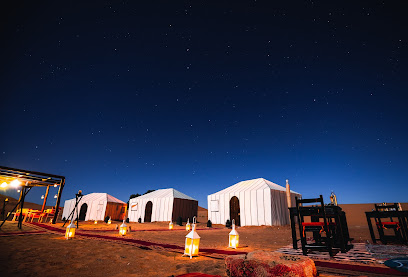
Sahara ATV Quad experience
Explore the stunning Sahara Desert on an exhilarating ATV Quad adventure in Merzouga, where adventure meets breathtaking landscapes.
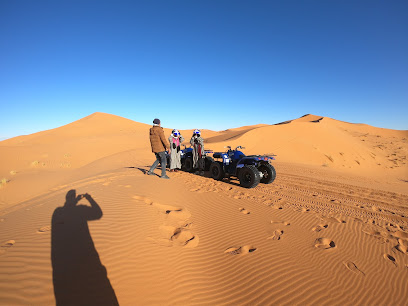
Ali & Sara's Desert Palace
Discover the magic of the Sahara at Ali & Sara's Desert Palace, where adventure meets comfort amidst the stunning Erg Chebbi Dunes in Morocco.
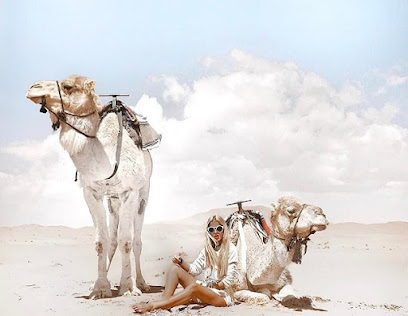
Mouhou Tours Company - Morocco Tours
Experience the enchanting Sahara Desert with Mouhou Tours, offering unforgettable camel treks and cultural adventures in Morocco.
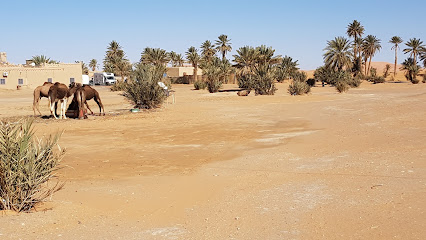
Merzouga desert experience
Explore the stunning Erg Chebbi dunes and rich Berber culture at Merzouga Desert Experience, a paradise for adventure seekers and nature lovers.
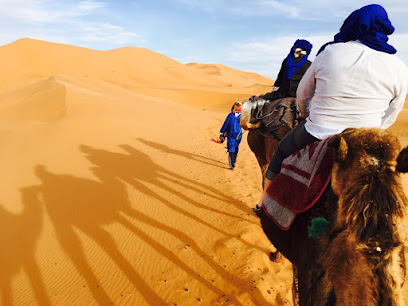
Lala Lallia Gran Dune
Experience the breathtaking beauty of Lala Lallia Gran Dune in Morocco, where golden sands meet vibrant sunsets in the heart of the Sahara Desert.
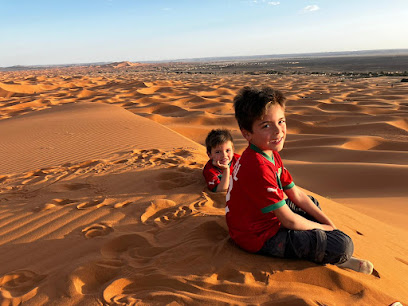
location Quad&byggy
Experience the thrill of hiking in the Sahara at Quad&byggy, where adventure meets the enchanting beauty of Merzouga's golden dunes.
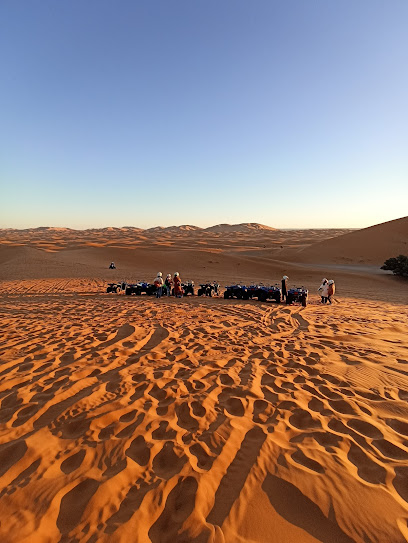
Bivouac Merzouga Experience
Discover the magic of the Sahara Desert at Bivouac Merzouga, where family adventures and Berber hospitality create unforgettable memories.
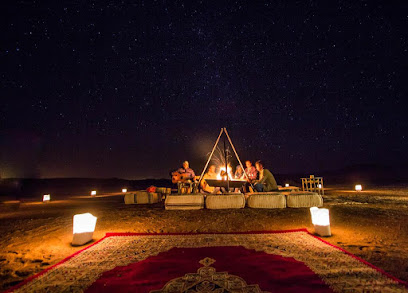
Sahara Trips Company
Discover the breathtaking Sahara Desert with Sahara Trips Company, offering unique tours and cultural experiences in Hassilabied, Morocco.
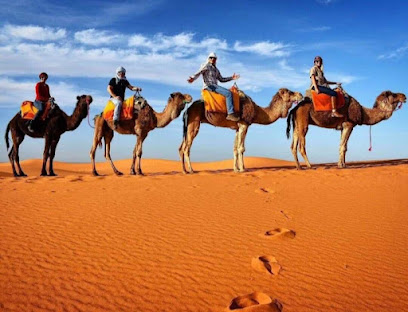
Morocco Bedouin Tours
Discover the breathtaking landscapes and rich culture of Merzouga, a desert gem in Morocco perfect for hiking and adventure.
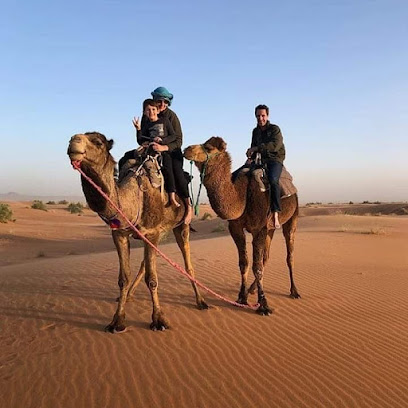
Sáhara Desert merzouga
Experience the breathtaking beauty of Merzouga Desert, where towering dunes meet rich Berber culture and unforgettable adventures await.
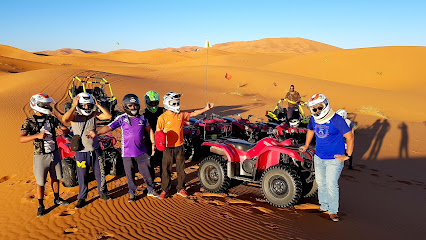
Days In Morocco
Explore the breathtaking landscapes of Morocco with Days In Morocco, your premier travel agency for unforgettable desert adventures and cultural experiences.
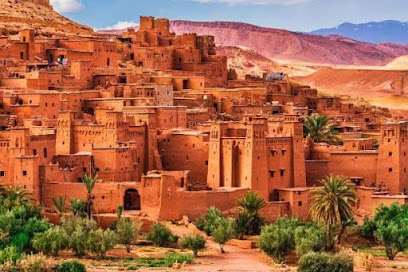
Visit Merzouga Desert
Explore the enchanting Merzouga Desert, home to towering dunes, vibrant culture, and unforgettable adventures under the stars.
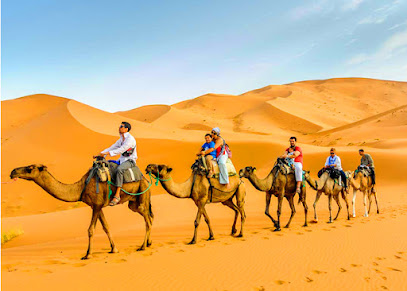
Essential places to dine
Resturant Nora
Experience authentic Moroccan cuisine at Restaurant Nora in Khamlia—where tradition meets taste in every dish.
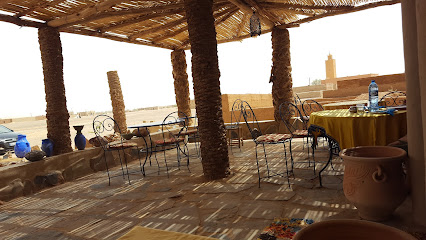
Cafe_Snack_Restaurant_ Hamid
Experience authentic Moroccan flavors at Café Snack Restaurant Hamid in Merzouga – where every dish tells a story.
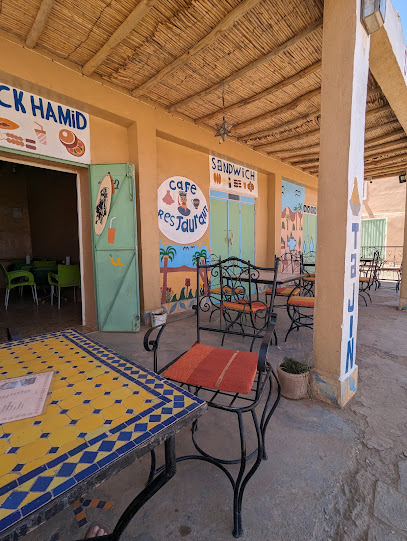
Restaurant Jordi & Naima
Experience authentic Moroccan cuisine at Restaurant Jordi & Naima in Merzouga, where flavors meet hospitality amid stunning desert scenery.
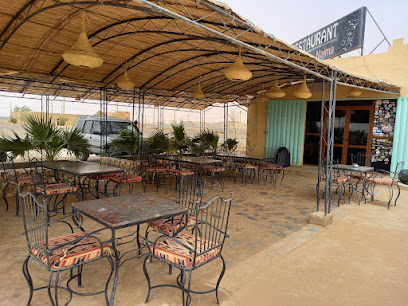
CAFE RESTAURANT TENERE
Experience authentic Moroccan cuisine at Café Restaurant Tenere in Merzouga – where tradition meets hospitality in a stunning desert setting.
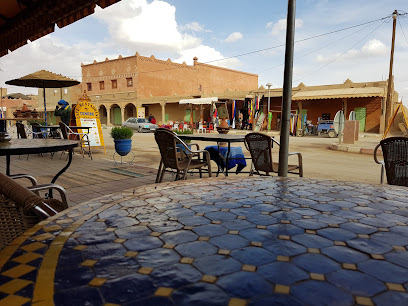
Café Restaurant Rimal Merzouga
Experience authentic Moroccan flavors at Café Restaurant Rimal Merzouga—where culinary delights meet breathtaking desert views.
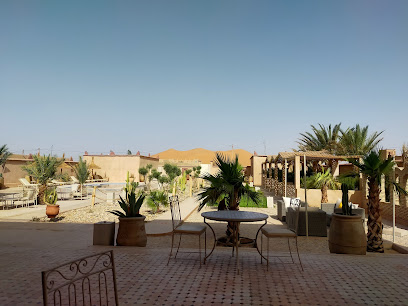
L'Homme du Désert
Experience authentic Moroccan cuisine and hospitality at L'Homme du Désert, your oasis in Merzouga's enchanting landscape.
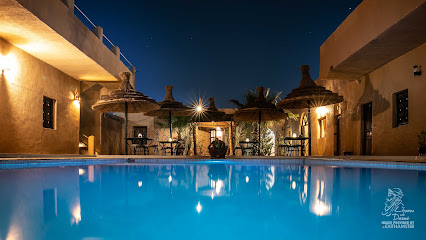
Cafe Snack Restaurant Said
Experience authentic Moroccan cuisine at Café Snack Restaurant Said in Merzouga – where flavor meets tradition amidst stunning desert landscapes.
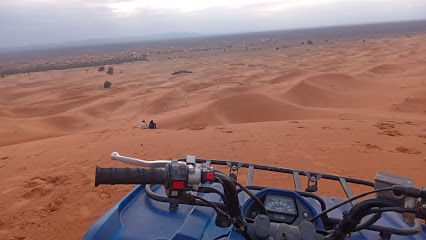
Restaurant Cafe SaharaTime
Experience authentic Moroccan flavors at Restaurant Cafe SaharaTime - a culinary oasis nestled in Hassilabied's breathtaking desert landscape.
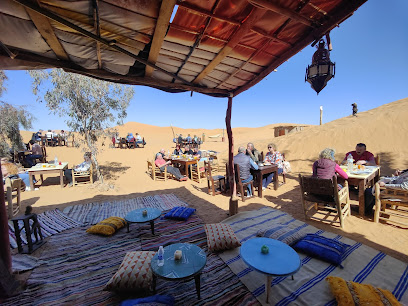
Café Restaurant Chez Ibrahim
Discover authentic Moroccan flavors at Café Restaurant Chez Ibrahim in Khemliya—where delicious pizza meets warm hospitality.
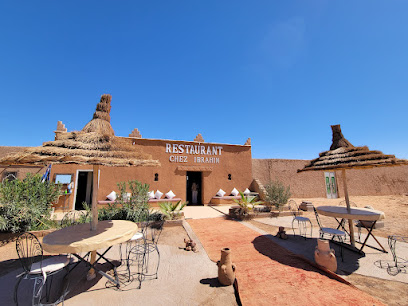
Cafe Restaurant Merzouga
Experience authentic Moroccan cuisine at Café Restaurant Merzouga amidst breathtaking desert landscapes.
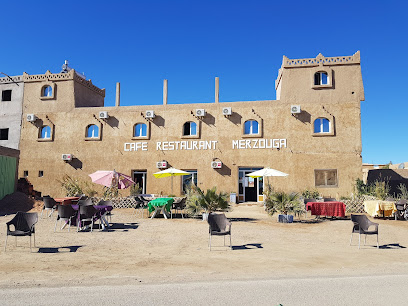
Snack Mustapha
Discover authentic Moroccan cuisine at Snack Mustapha in Merzouga - where every dish tells a story.
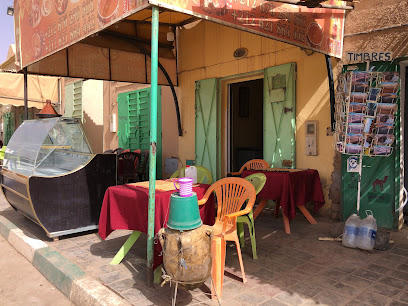
CAFE RESTAURANTE MORENO
Discover authentic Moroccan flavors at Café Restaurante Moreno in Merzouga – where tradition meets breathtaking desert views.
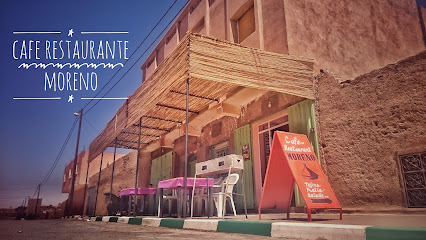
La Grotte Dunes Restaurant
Savor traditional Moroccan dishes amidst stunning desert landscapes at La Grotte Dunes Restaurant in Merzouga.
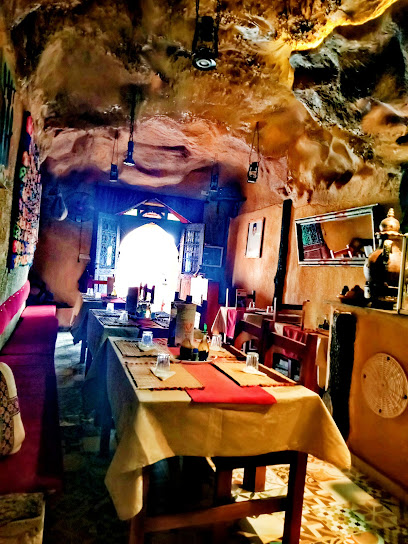
Cafe Restaurant Touga
Experience authentic African flavors at Cafe Restaurant Touga in Khamlia - your gateway to delicious Moroccan cuisine amidst stunning desert scenery.
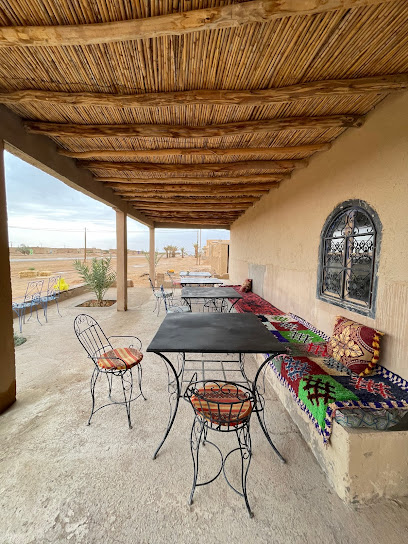
Café Restaurant Les Amis
Experience authentic Moroccan cuisine at Café Restaurant Les Amis in Merzouga—where delightful flavors meet warm hospitality.
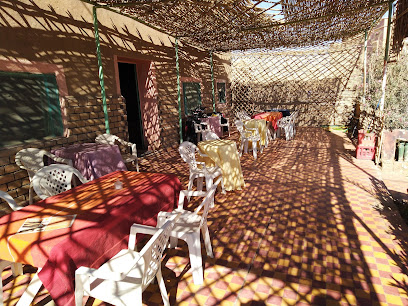
Markets, malls and hidden boutiques
Dépôt Nomade
Explore the vibrant Dépôt Nomade shopping mall in Hassilabied, where Moroccan culture meets modern retail in a unique and memorable shopping experience.
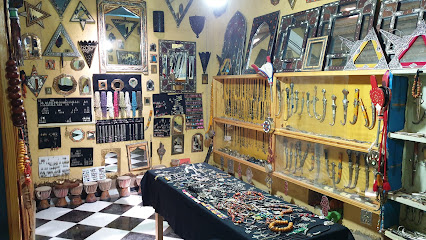
DRISS FOSSILS AND MINERLAS SHOP
Explore the unique Driss Fossils and Minerals Shop in Hassilabied for authentic fossils and stunning minerals that capture Morocco's natural beauty.
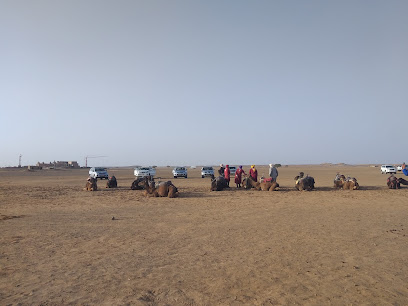
Merzouga Nomadic Art Crafts
Discover authentic Moroccan craftsmanship at Merzouga Nomadic Art Crafts, where local artisans showcase their beautiful handmade creations.
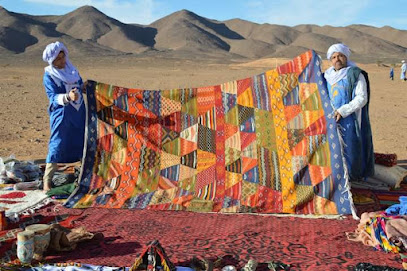
Morocco Products Shop
Explore the rich tapestry of Moroccan culture through exquisite handicrafts and carpets at the Morocco Products Shop in Merzouga.
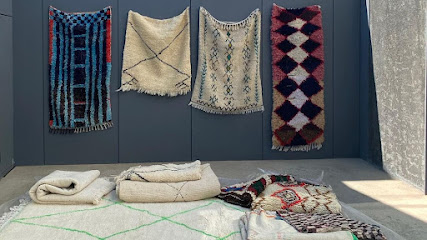
Herbier kounouz sahara
Discover the essence of Moroccan craftsmanship at Herbier Kounouz Sahara, your premier gift shop in Merzouga, offering unique treasures from the Sahara Desert.
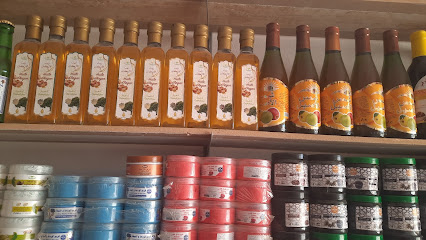
Fossiles Mineraux Merzouga
Discover the captivating world of fossils at Fossiles Mineraux Merzouga, where ancient history meets modern shopping.
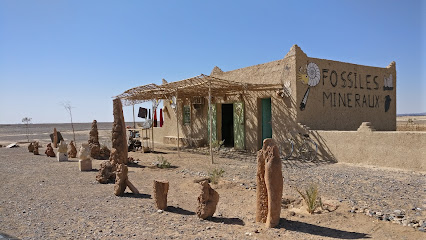
Camel Trekking Morocco Tours
Explore the Sahara Desert with Camel Trekking Morocco Tours for a unique adventure filled with culture, stunning landscapes, and unforgettable experiences.
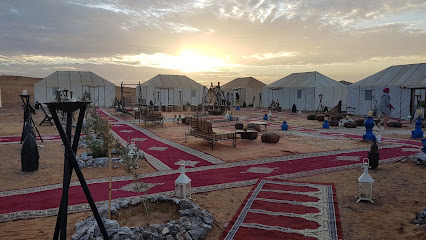
Morocco Desert Tours
Discover the enchanting Sahara Desert with unforgettable camel treks and cultural experiences in Merzouga, Morocco.
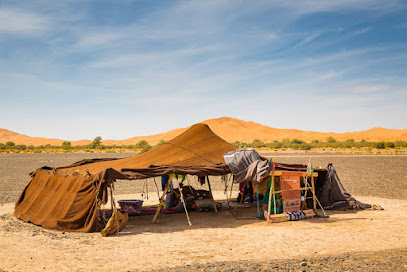
Merzouga 4×4
Explore the enchanting sand dunes of Merzouga with thrilling 4x4 adventures, perfect for creating unforgettable desert memories.
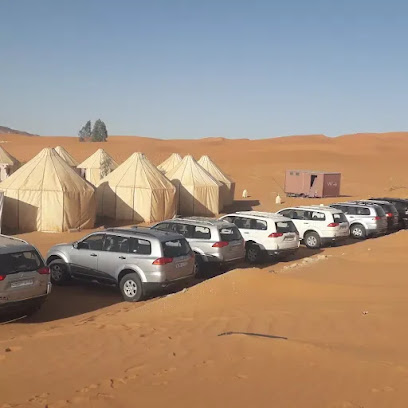
Merzouga Morocco
Experience the breathtaking beauty of Merzouga's sand dunes and immerse yourself in the rich culture of Morocco's desert landscapes.

Essential bars & hidden hideouts
Resturant Nora
Experience the rich flavors of authentic Moroccan cuisine at Restaurant Nora in the heart of the Sahara Desert, Merzouga.
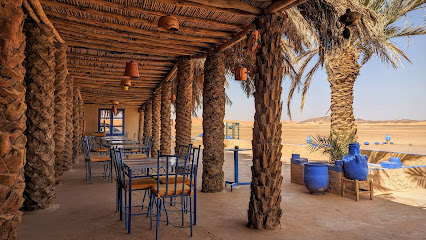
Cafe_Snack_Restaurant_ Hamid
Experience authentic Moroccan cuisine and warm hospitality at Café Snack Restaurant Hamid in Merzouga, a must-visit for travelers.
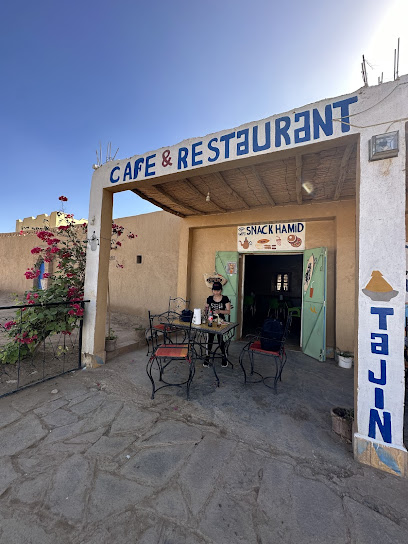
Restaurant Jordi & Naima
Experience the best of Moroccan cuisine at Restaurant Jordi & Naima, a culinary oasis in Merzouga's stunning desert landscape.
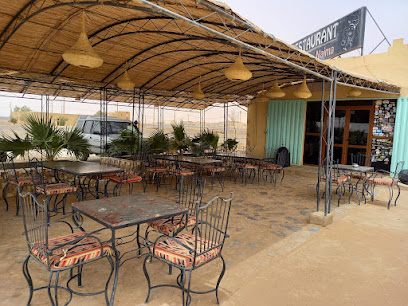
CAFE RESTAURANT TENERE
Experience the rich flavors of authentic Moroccan cuisine at Café Restaurant Tenere in Merzouga, where every meal is a cultural journey.
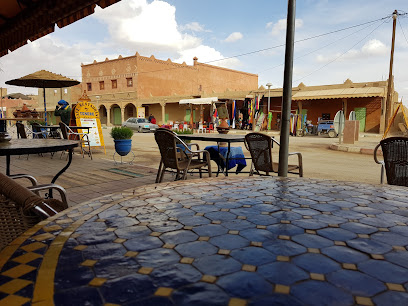
Cafe Snack Restaurant Said
Discover authentic Moroccan flavors at Cafe Snack Restaurant Said - a top-rated grill experience in Merzouga, perfect for budget travelers.
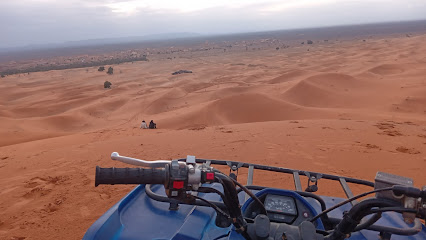
Restaurant Cafe SaharaTime
Indulge in authentic Moroccan cuisine and breathtaking desert views at Cafe SaharaTime, a must-visit culinary destination in Hassilabied.
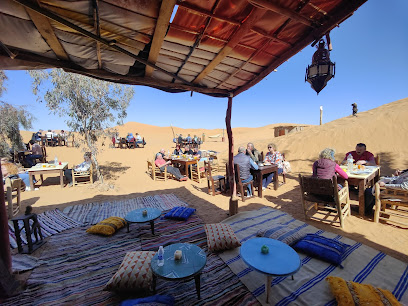
Café Restaurant Chez Ibrahim
Explore the rich flavors of Morocco at Café Restaurant Chez Ibrahim, where local hospitality meets delicious cuisine in Khamlia.
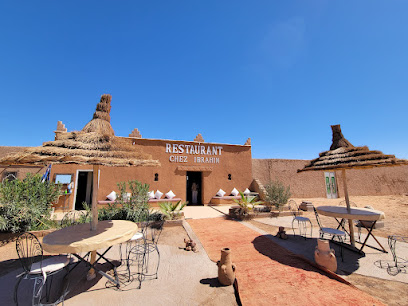
Chez Youssef
Immerse yourself in the beauty of Merzouga at Chez Youssef, where Moroccan hospitality meets desert adventure.

Snack Mustapha
Discover the authentic flavors of Morocco at Snack Mustapha, a culinary gem in Merzouga offering delicious traditional dishes and a welcoming atmosphere.
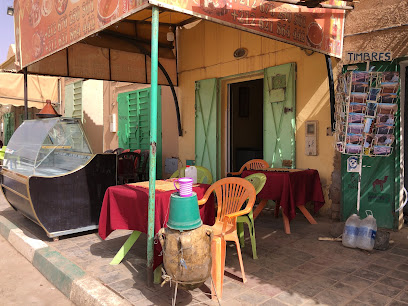
Cafe Restaurant Touga
Experience authentic African flavors at Cafe Restaurant Touga in Khamlia, near Merzouga, where every meal is a cultural journey.
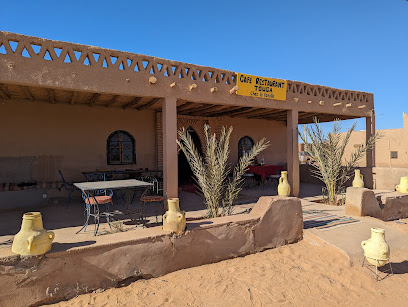
Cafe Restaurant Itran
Experience authentic Moroccan cuisine at Café Restaurant Itran in Merzouga, where every meal is a journey into local culture and flavor.
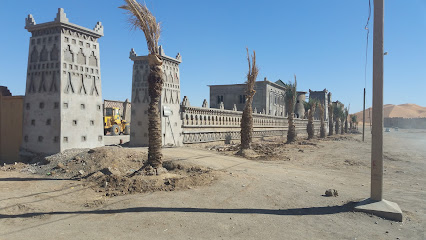
Kasr Diafa Restaurant & Snack & Cafe
Experience the authentic taste of Morocco at Kasr Diafa Restaurant & Snack & Cafe, offering delicious grilled dishes in the heart of Merzouga.
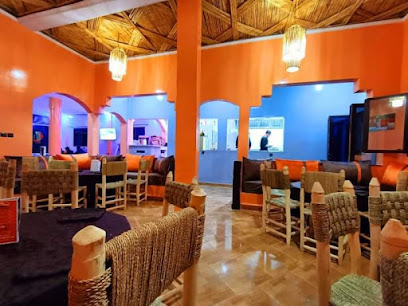
Kasbah Merzouga Bar
Discover the charm of Kasbah Merzouga Bar, where Moroccan culture meets breathtaking desert views in the heart of Merzouga.
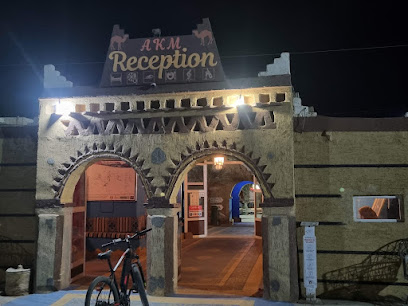
Riad Tighmart Merzouga
Experience serene desert vibes at Riad Tighmart Merzouga, your ultimate oasis in the heart of the Sahara.
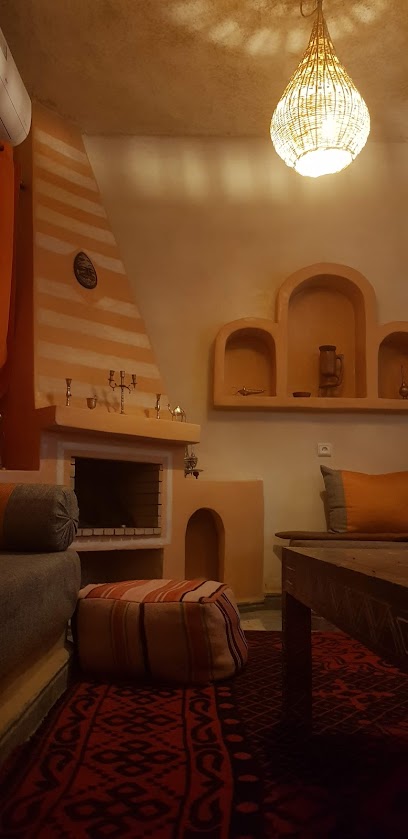
Local Phrases about Merzouga Region
-
- Helloسالم
[sālm] - Goodbyeوداعا
[wadā'ana] - Yesنعم
[na'am] - Noلا
[lā] - Please/You're welcomeمن فضلك
[min faḍlik] - Thank youشكرا
[shukran] - Excuse me/Sorryعذرا
[ʿudhran] - How are you?كيف حالك؟
[kayf ḥāluk?] - Fine. And you?بخير. وأنت؟
[bikhayr. wa'ant?] - Do you speak English?هل تتحدث الإنجليزية؟
[hal tatahadath al'injilizia?] - I don't understandلا أفهم
[la afham]
- Helloسالم
-
- I'd like to see the menu, pleaseأريد أن أرى القائمة، من فضلك
[urīd an ará alqā'ima, min faḍlik] - I don't eat meatأنا لا آكل اللحم
[anā lā ākil allahm] - Cheers!صحتين!
[ṣaḥtayn] - I would like to pay, pleaseأريد أن أدفع، من فضلك
[urīd an adfa', min faḍlik]
- I'd like to see the menu, pleaseأريد أن أرى القائمة، من فضلك
-
- Help!النجدة!
[alnajda!] - Go away!انصرف!
[ansarf!] - Call the Police!اتصل بالشرطة!
[itasil bialshurṭa!] - Call a doctor!اتصل بطبيب!
[itasil bialṭabib!] - I'm lostلقد ضللت الطريق
[laqad ḍalalt altariq] - I'm illأنا مريض
[anā marīḍ]
- Help!النجدة!
-
- I'd like to buy...أريد أن أشتري...
[urīd an ashtari...] - I'm just lookingأنا فقط أتفرج
[anā faqaṭ atfarij] - How much is it?كم الثمن؟
[kam aththaman?] - That's too expensiveهذا غالي جدا
[hadha ghali jiddan] - Can you lower the price?هل يمكنك خفض السعر؟
[hal yumkinuk khafḍ alsu'ar?]
- I'd like to buy...أريد أن أشتري...
-
- What time is it?كم الساعة؟
[kam alssa'ah?] - It's one o'clockالساعة واحدة
[alssa'ah wahida] - Half past (10)النصف بعد (10)
[alnusfu ba'd (10)] - Morningالصباح
[alṣabāḥ] - Afternoonالظهر
[alẓuhr] - Eveningالمساء
[almasā'] - Yesterdayأمس
[ams] - Todayاليوم
[alyawm] - Tomorrowغدا
[ghadan] - 1واحد
[wāḥid] - 2اثنان
[ithnān] - 3ثلاثة
[thalāthah] - 4أربعة
[arba'ah] - 5خمسة
[khamsah] - 6ستة
[sittah] - 7سبعة
[sab'ah] - 8ثمانية
[thamānih] - 9تسعة
[tis'ah] - 10عشرة
['asharah]
- What time is it?كم الساعة؟
-
- Where's a/the...?أين ...؟
[ayn ...?] - What's the address?ما هو العنوان؟
[mā huwa al'ūnwan?] - Can you show me (on the map)?هل يمكنك أن تريني (على الخريطة)؟
[hal yumkinuk 'an turiyni (ʿala alkhariṭa)?] - When's the next (bus)?متى يأتي القادم (الحافلة)؟
[mata ya'ti alqādim (alḥāfilah)?] - A ticket (to ....)تذكرة (إلى ...)
[tadkirah (ʾila ...)]
- Where's a/the...?أين ...؟
History of Merzouga Region
-
The Merzouga region is deeply rooted in the traditions and culture of the Berber people, who have inhabited the area for centuries. The Berbers, also known as the Amazigh, are indigenous to North Africa and have maintained their unique language, customs, and crafts despite various invasions. The local Berber communities in Merzouga are known for their distinctive architecture, traditional music, and vibrant artisan crafts, such as weaving and pottery.
-
Merzouga was historically a significant waypoint in the trans-Saharan trade routes that connected the Mediterranean world with sub-Saharan Africa. These routes facilitated the exchange of goods such as gold, salt, and spices, and helped to spread cultural influences, including Islam. The bustling trade caravans that once traversed the region have left an indelible mark on the local culture, seen in the blend of Arab and Berber influences in the area.
-
During the 17th century, the Alaouite dynasty rose to power in Morocco, establishing their influence in regions including Merzouga. The Alaouites, who continue to rule Morocco today, were instrumental in unifying the country and consolidating Islamic practices. The dynasty's influence brought about significant socio-economic changes and contributed to the development of infrastructure and trade in the Merzouga region.
-
In the early 20th century, Morocco became a French Protectorate, leading to notable changes in the Merzouga region. The French administration sought to exploit the region's resources and develop infrastructure, which included the construction of roads and the introduction of modern agricultural techniques. This period also saw increased interaction between local Berber communities and European settlers, impacting the cultural landscape of Merzouga.
-
Following Morocco's independence from French colonial rule in 1956, the Merzouga region experienced significant development. The Moroccan government invested in improving infrastructure, promoting tourism, and preserving cultural heritage. Merzouga, with its stunning Erg Chebbi dunes, became a popular destination for travelers seeking authentic Moroccan experiences, contributing to the region's economic growth and cultural preservation.
-
In recent years, there has been a renewed effort to revive and celebrate the unique cultural heritage of the Merzouga region. Local initiatives and government programs have focused on promoting traditional Berber music, dance, and crafts. Festivals and cultural events attract visitors from around the world, offering them an opportunity to immerse themselves in the rich history and vibrant culture of Merzouga.
Merzouga Region Essentials
-
Merzouga is located in southeastern Morocco, near the Algerian border. The nearest airport is Errachidia's Moulay Ali Cherif Airport, approximately 130 kilometers away. From Errachidia, you can take a taxi or a bus to Merzouga. Alternatively, you can fly into Marrakech or Fes and take a bus or a private transfer. The journey from Marrakech or Fes typically takes around 8 to 10 hours by road.
-
In Merzouga, the most common mode of transportation is by 4x4 vehicles, especially for desert excursions. Local taxis are available, and you can also rent quad bikes or take camel rides to explore the dunes. For longer journeys, buses and shared taxis (grand taxis) connect Merzouga with nearby towns and cities.
-
The official currency in Morocco is the Moroccan Dirham (MAD). Credit cards are accepted in some hotels, restaurants, and shops, but it is advisable to carry cash, especially in smaller establishments and rural areas. ATMs are available in nearby towns like Rissani, but it is wise to withdraw sufficient cash before arriving in Merzouga.
-
Merzouga is generally a safe destination for tourists. However, like any travel destination, it is advisable to take standard precautions. Avoid walking alone at night in unfamiliar areas and keep an eye on your belongings in crowded places. There are no specific high-crime areas targeting tourists in Merzouga, but it is always best to stay vigilant and aware of your surroundings.
-
In case of emergency, dial 19 for the police or 15 for medical assistance. The nearest medical facilities are in Rissani, about 40 kilometers away. It is recommended to have travel insurance that covers medical emergencies. For minor health issues, there are pharmacies in nearby towns where you can purchase over-the-counter medications.
-
Fashion: Do dress modestly, especially when visiting religious sites. Avoid wearing revealing clothing. Religion: Do respect local customs and traditions. Always ask for permission before photographing people, especially in rural areas. Public Transport: Do be respectful and give up your seat to elderly passengers. Don't eat or drink on public transport. Greetings: Do greet people with a handshake or a slight bow of the head. Eating & Drinking: Do try local delicacies and accept food offerings graciously. Don't refuse hospitality, as it is considered impolite.
-
To experience Merzouga like a local, visit the local markets in Rissani where you can buy fresh produce and traditional Moroccan goods. Engage with locals, as they are often friendly and willing to share stories about the area's history and culture. Don't miss taking a camel trek into the Erg Chebbi dunes and spending a night in a traditional Berber tent under the stars. For a unique experience, try sandboarding on the dunes.
Trending Landmarks in Merzouga Region
-
Dunes d'Erg Chebbi
-
Kasbah Mohayut
-
Merzouga Desert
-
Auberge Kasbah Merzouga
-
Palais des Dunes
-
Erg Chebbi
-
Hotel Kasbah Azalay Merzouga
-
Hôtel Les Portes du Désert
-
Hotel Sahara Garden
-
Riad Chebbi
-
L'Homme du Désert
-
Kasbah Le Touareg
-
Sahara Desert Luxury Camp
-
Desert Villa: boutique Hotel Merzouga
-
Maison Merzouga Guesthouse
Nearby Cities to Merzouga Region
-
Things To Do in Meknes
-
Things To Do in Marrakech
-
Things To Do in Casablanca
-
Things To Do in Oujda
-
Things To Do in Taroudant
-
Things To Do in Chefchaouen
-
Things To Do in Tlemcen
-
Things To Do in Tetouan
-
Things To Do in Asilah
-
Things To Do in Agadir
-
Things To Do in Tangier
-
Things To Do in Essaouira
-
Things To Do in Europa Point
-
Things To Do in Gorham's Cave Complex
-
Things To Do in St. Michael's Cave








